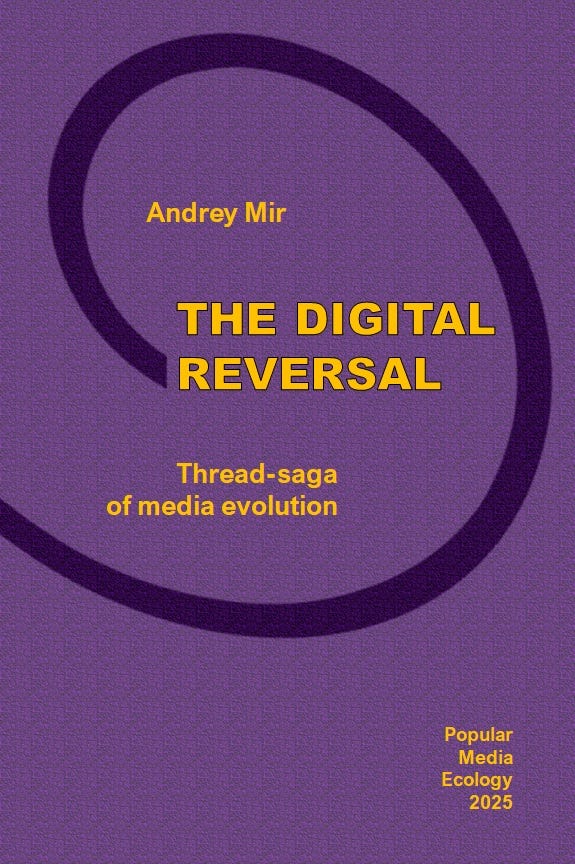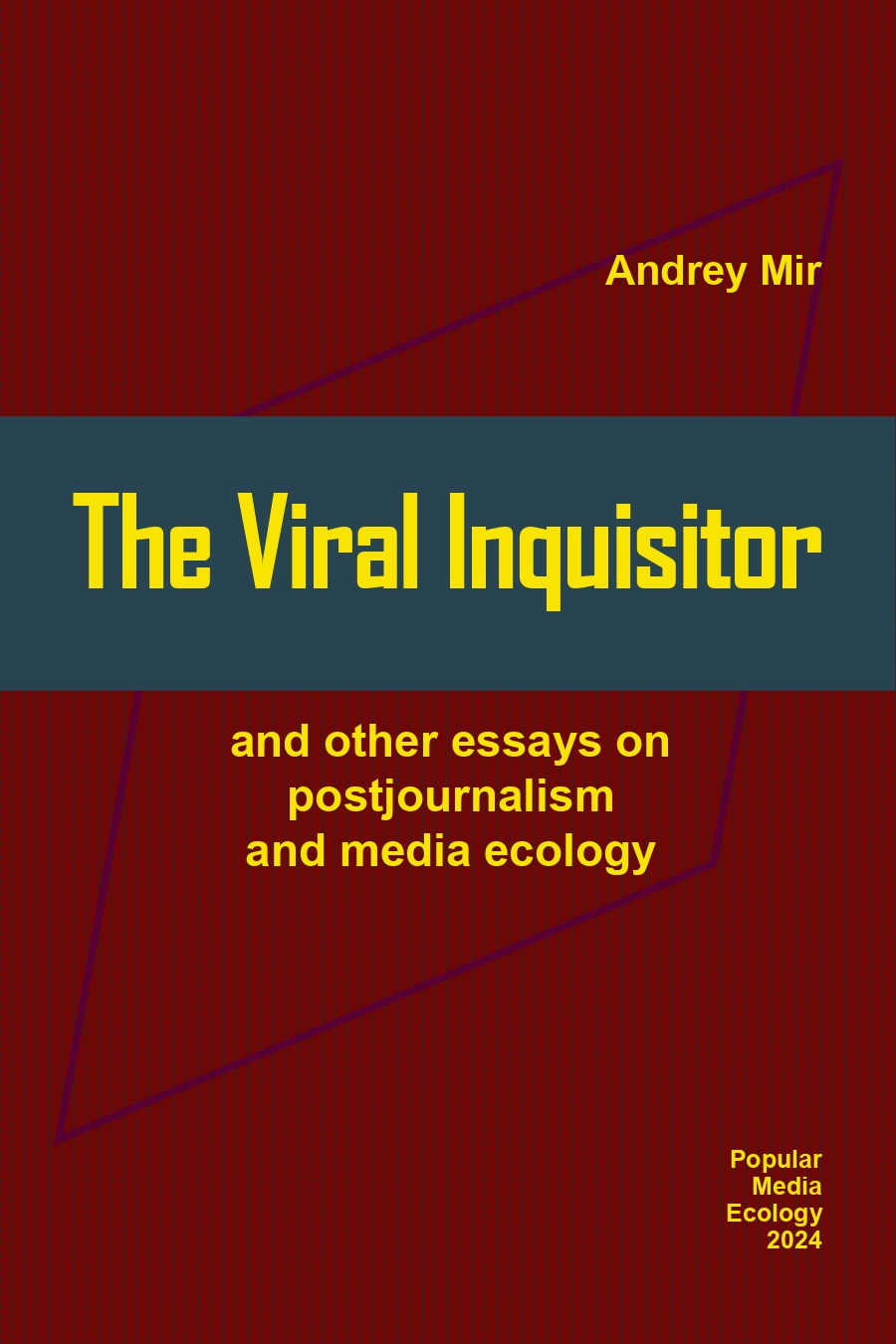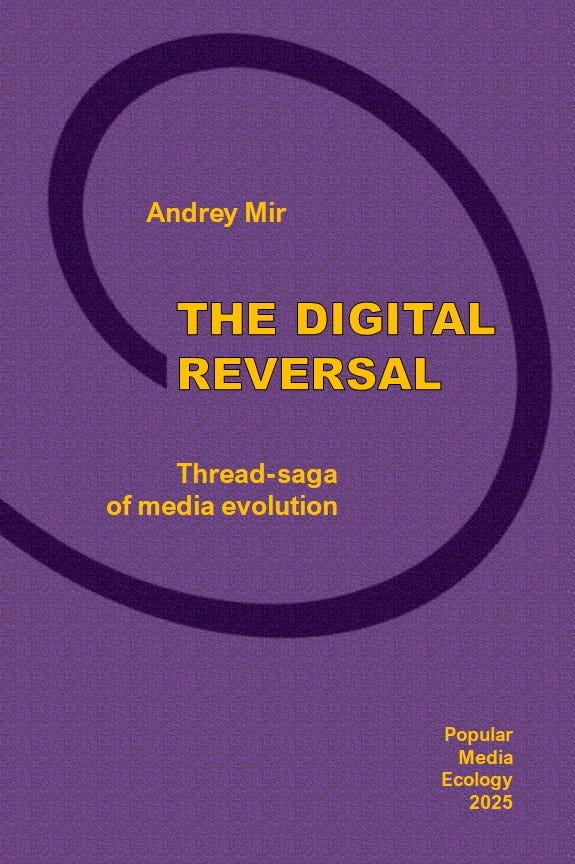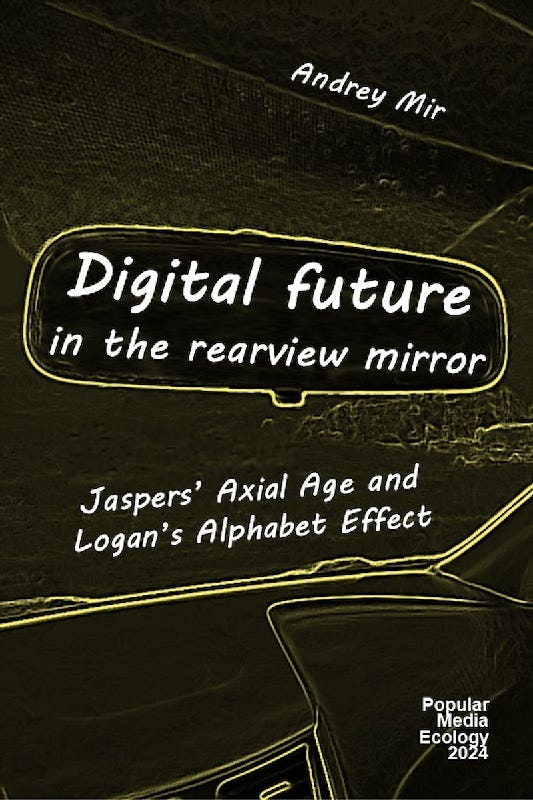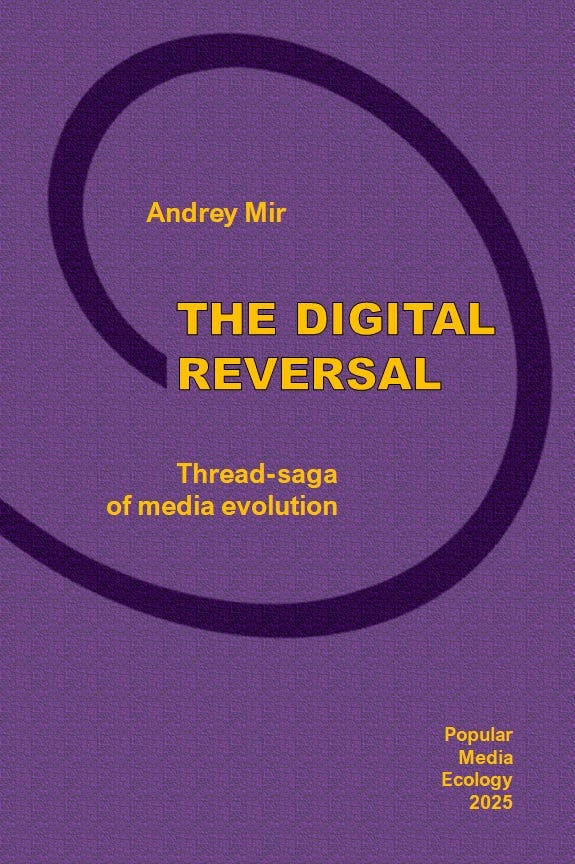How we acquire knowledge: The reversal from reading to asking
Generative AI is a super-elder and super-traveler, just like the gods in an oral culture.
Excerpts from The Digital Reversal. Thread-saga of Media Evolution (just published, available on Amazon). The entire book is written in tweets—1,295 of them.
In oral cultures, people could learn something new only by experiencing it or by asking those who knew better—elders, travelers, or gods (who were both super-elders and super-travelers). There was no other way to learn beyond experience and listening to elders or bards.
Writing detached the known from the knower, letting people learn something without experiencing it or asking someone (such a relief for introverts—though they emerged precisely because of literacy). One could still ask or learn firsthand, but reading offered a new path.
The effects of writing overlapped and cascaded. Writing rewired cognitive abilities for searching and storing knowledge, reshaping cultural practices. Storing records led to archives and libraries, while the need for quick access led to cataloging—the classification of records.
The classification of records led to the division of universal knowledge into separate scientific disciplines. Instead of god-specialists curating different areas of life, people began attributing knowledge to objective sciences accumulated in writing.
“The fragmenting of activities, our habit of thinking in bits and parts… reflected the step-by-step linear departmentalizing process inherent in the technology of the alphabet,” said McLuhan. The alphabet and print fostered not just human detachment but also world structuring.
***
How would an oral person learn what fish inhabit Lake Ontario? Only by fishing or asking a fisherman. In a literate culture, we could still ask—but we would know that a fisherman’s knowledge was limited to his experience and didn’t represent all knowledge about fish in Ontario.
A better way would be to find a book about fish living in Lake Ontario. We’d go to the library and search the catalog under “Geography,” “Biology,” or “Ichthyology.” We’d naturally know that full, precise knowledge was stored in books at the intersection of those disciplines.
This navigation skill is ingrained in the literate mind. An educated person doesn’t have all knowledge but has an abstract catalog of it. The world is structured by rational and logical principles. Writing conditioned the mind to see the world through these principles.
***
Digital means of storing and accessing knowledge began changing this cognitive setting. Still, early websites mimicked catalogs, with links often laid out like a table of contents. The early internet borrowed its design from the older medium—books.
Touchscreens introduced icons and thumbnails that evolved into picture-based tiles. This made links less textual and more “palpable”—and obsolesced the “table of contents” and its structuring power. But what truly disrupted the literate structure of the world was the search bar.
Now, only directory trees on PCs or websites represent a pattern of knowledge organization borrowed from catalogs. Each time we search for a file or saved data in a directory, it activates and maintains the cognitive skill of abstract classification, forged by literacy.
Keyword search upends this tiny but regular cognitive exercise. Instead of abstract classifications, keyword search relies on experience-based guessing, with no need to know the entire structure. The brain no longer practices creating and recognizing knowledge structures.
Catalog requires you to know the typical. Keyword search works better if you know the atypical. Catalog assumes the world has a neat structure. Keyword search turns the world into a mess, a pile of garbage where you grab what you need. Prompt literacy destroys literacy.
***
Search engines work better not just with words but with unique combinations of words—full sentences. An inquiry on Google is essentially conversational. It retrieved asking as the main mode of acquiring knowledge—a feature of orality.
Asking ChatGPT completed the reversal. A generative AI possesses nearly all human knowledge and shares it through a conversational interface. Generative AI is a super-elder and super-traveler, just like the gods in an oral culture—answering questions if you ask properly.
Paradoxically, we still use text for conversation with AI (a residue of print literacy). However, voice assistants already allow talking to AI, thus not only reversing literacy but also retrieving oral inquiry, where the wise “tribal elder” turns into a complaisant sidekick.
(Yet, text may survive in chats with AI, simply because personal devices have conditioned us to digital intimacy. Unlike loud, exposed oralists, people of digital orality might prefer intimate typing to speaking to AI. But it will be texting, not text, of course.)
Digital orality reverses knowledge acquisition from scientific inquiry, typical of literacy, to conversational inquiry, typical of orality. It rewires the brain, shifting knowledge of the world from complex, systematic categories to highly accessible but scattered anecdotes.
***
Collecting farmers’ offerings, temple priests—the first bureaucrats—not only kept records but also issued work orders: how much grain to store or sell, what to do with wine or skins. They also ordered sluices opened to let water flow to farmers who had paid their dues.
Such work orders show that the need for classification of records not only structures knowledge of the world—it also structures human actions. The catalog gave us a cognitive pattern for structured planning.
This book happened not because I had an epiphany, but because I arranged ideas into thematic sections—linearly, hierarchically, and with a certain sense of completeness. The project became possible only thanks to the cognitive training in ordering, passed by literate generations.
Thanks to the cognitive habit of classification shaped by literacy, humans can structure their actions and make the environment comply with structured plans. Oral people lived by nature’s flow, at best guessing its cycles. Literacy allowed humans to plan their environments.
Oral people acted in sync with seasonal and ritualistic cycles or in response to events. Literacy detached action from nature’s flow, reversing it from reactive to proactive. Planned or ordered actions are carried out in space and time. Literacy enabled time management.
***
Now, digital orality reduces the need for classification. Digital epistemology relies not on classification but on attraction. The artificial effort of classification is replaced by the natural skill of “asking.” The search engine does the rest.
In fact, classification is inherently redundant in terms of effort. It structures things in advance, just in case they’re needed. But digital search can easily summon things if and when they’re actually needed, making classification less useful in a digital environment.
Use it or lose it: classification fades—orderly structuring disappears with it. In the digital mind, tidying environments is too laborious. The flow doesn’t wait. If a thing is important, its perceived importance—its attraction—replaces the need to classify all things in advance.
“Our electrically-configured world has forced us to move from the habit of data classification to the mode of pattern recognition,” said McLuhan. This barely recognizable epistemological shift leads to the demise of planning and time management on a generational scale.
Excerpts from The Digital Reversal. Thread-saga of Media Evolution (just published—get it on Amazon).
See also books by Andrey Mir:




